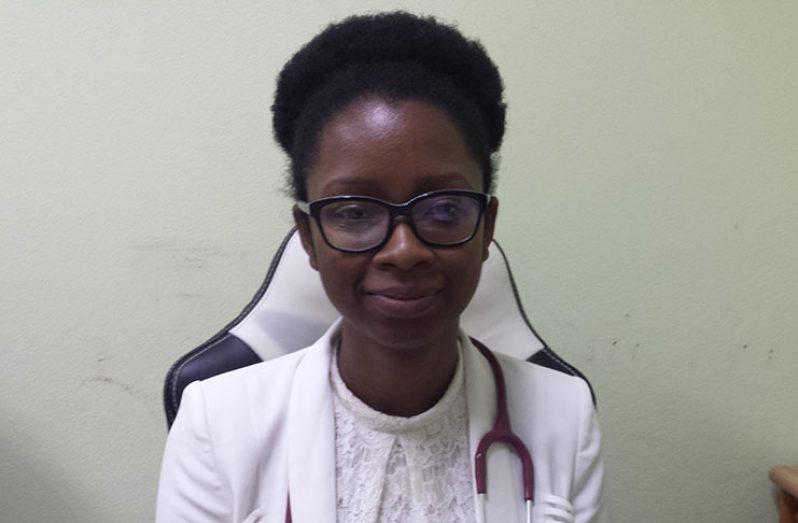GPHC focusing on early identification and management of Sickle Cell Anaemia and Thalassaemia
PLANS are in the pipeline for the implementation of systems at the Georgetown Public Hospital Corporation’s (GPHC) Paediatric and Medical Outpatient Departments, to make room for improved standards of care for patients with Sickle Cell Anaemia and Thalassaemia.
Some of these measures are already in the initial stages of implementation by management of the GPHC. Another crucial facility has come as a donation by the Pan American Health Organization/World Health Organization (PAHO/WHO) and was accepted by the hospital’s Chief Executive Officer, Brigadier George Lewis, at a formal handing-over ceremony where Head of Department/Consultant of the Paediatric Medicine Department, Dr. Clive Bowman and Senior Registrar in the Internal Medicine Department, Dr. Grace White were present to receive the items. Others still, are recommendations that paediatrician, Dr. Sherelyn Stanton hopes to pursue as a part of her post-Commonwealth Professional Fellowship plan for improvement in the care of persons affected by Sickle Cell Anaemia and Thalassaemia.
Computers from PAHO:
The Pan American Health Organization (PAHO), in yet another demonstration of its unwavering commitment to the advancement of health care in Guyana, donated two computers and two printers to the GPHC, one each for the paediatric clinic and the institution’s medical clinic for adults.
The presentation of the computers and printers was done two weeks ago by PAHO’s Resident Representative, Dr. William Adu-Krow, and was rather timely, having come just one week before World Sickle Cell Awareness Day. The primary aim of the gesture was to facilitate the development of a data base for adult and paediatric Sickle Cell and Thalassaemia patients.
Other areas that will receive priority attention by the facility include, but are not limited to:
Neonatal Screening particularly for Sickle Cell disease indicating carrier or disease status. Consequently, parents can receive counselling and become aware of the numerous options for their babies. Since sickle cell can affect all regions of the body including the brain, this intervention can, at a very early stage, allow for prophylactic measures to be implemented to prevent sickle cell-provoked stroke and other sickle cell-related states.
Registering another plus for the institution, the GPHC Paediatric Medicine Department has already started a neonatal screening pilot project and is currently doing screening of babies for sickle cell disease and congenital hypothyroidism. This screening project at the GPHC is being conducted by Paediatrician, Dr. Areefa Alladin-Karran and Head of Laboratory Services, Dr. Pheona Mohamed-Rambarran. The benefit of screening the thyroid function is to determine the thyroid amounts in babies, and if they are below what is required, the doctors would be able to detect that and give them replacement thyroid, so neurologically they would function normally.
The neonatal pilot project is being undertaken in order to justify that neonatal screening is actually needed at the GPHC. The goals of neonatal screening would be to detect an affected child at the earliest possible time, because some of those things that are screened for have significant implications if they are untreated from the earliest stages.
• Information, Education, Communication (IEC) Materials: Also recommended is the need for the distribution of IEC materials such as pamphlets on sickle cell disease in schools, at clinics and to the public at large, so persons can become knowledgeable about the illness and know what to expect, and how to be of help when sickle cell anaemia patients are in crises and outside of the hospital setting.
In the classroom setting:
• There is a role for parents as well as teachers to be aware of this disease, Dr. Stanton said. “If for example, a child is not doing well in school, it may be related to their sickle cell disease and maybe they need to have one-on- one teaching, or maybe an additional class. Or perhaps the teachers do not understand that this child may have pains from time to time and so they are not sympathetic to what the child is going through. They may even want to go to the washroom regularly. Therefore, it would help if teachers are sensitised about the nature of sickle cell disease,” Dr. Stanton emphasised.
She also sees merit in having a nursing specialist; a doctor or another person who is familiar with the content and knows how to deliver it appropriately, to go to schools, etc.
* Transitioning of children with sickle cell from the paediatric clinic to adult medical clinics is also very important. They need to be aware of what to expect and what are the expected behaviours and the benefits in the adult clinics and wards. She noted that not everybody transitions very well, since it now means having to forgo most, if not all of the support patients had as a child in the paediatric medicine services, and with that can come a lot of defaulting from clinic as adults.
* Outreach Programmes: It is also proposed that outreach clinics/programmes on Sickle Cell disease be held at hospitals such as West Demerara, Suddie, New Amsterdam to ensure that persons at different ends of the country can access care geared toward this specific disease.




.png)









